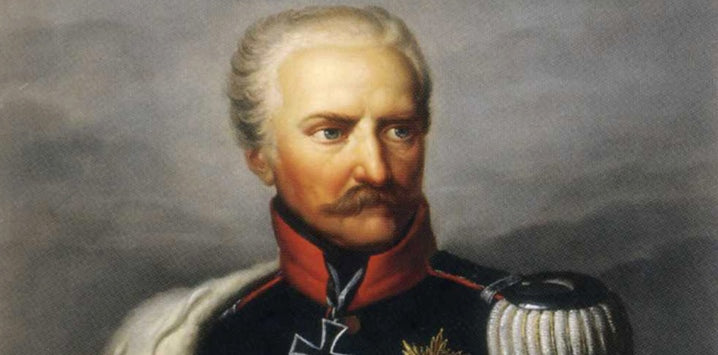Part seven of our series on ten greatest generals of the Napoleonic Wars examines the career of Prussian Field Marshal Gebhard Leberecht von Blücher. Blücher was by no means the most skilled battlefield tactician, and relentless aggression was not always welcome, but his drive and determination in the 1813-14 campaigns as well as his commitment to supporting Wellington and Waterloo wins him a place on this list.
Gebhard Leberecht von Blücher (1742-1818), Fürst von Wahlstatt
The Prussian field Marshal Gebhard von Blücher is undoubtedly one of the most colourful characters of the Napoleonic period. A cavalryman, Blücher began his military career in Swedish service in 1758, before falling into Prussian captivity in 1760 and joining the Prussian Army. He would remain in service for the remainder of the Seven Years War. After being dismissed by Frederick the Great for insubordination, he returned to the army following Frederick's death and served in the French Revolutionary Wars. Promoted to general in 1794, he commanded the Prussian cavalry in the 1806 campaign and was present at the calamitous defeat to Marshal Davout at Auerstedt. Commanding the rearguard, he was taken into French captivity but soon exchanged for Claude Victor-Perrin, the future marshal.
In 1809 and 1812 Blücher had advocated for alliances with Austria and Russia in order to take the fight against Napoleon again, but King Frederick William III continued to observe the alliance with Napoleon, made under duress at Tilsit following Napoleon's victory in the War of the Fourth Coalition. Nevertheless, once Napoleon was defeated in Russia in 1812, Prussia joined Russia to form the Sixth Coalition in early 1813 and the 71 year old Blücher was recalled to command the Prussian Army. His Chief of Staff was Gerhard von Scharnhorst, the brilliant staff officer and strategist who had been responsible for the reform programme to rebuild the Prussian Army following its humiliation at Napoleon's hands at Jena and Auerstedt. Scharnhorst had earlier served as Blücher's Chief of Staff in 1806.
Blücher's advanced years and declining mental health meant that he was largely dependent on Scharnhorst and his successor August von Gneisenau, an equally talented staff officer who replaced Scharnhorst when he died in June from a wound sustained at the Battle of Lützen. Nevertheless, Blücher continued to display considerable energy riding at the head of his army. His aggression earned him the nickname “Marshal Forwards.” As the commander of the 100,000 man Russo-Prussian Army of Silesia, Blücher scored a significant victory over Marshal Macdonald at Katzbach on 26 August. The battle took place during a thunderstorm and was decided by fierce hand-to-hand fighting with bayonets and a Prussian cavalry charge. The Army of Silesia then contributed to the decisive victory over Napoleon himself at Leipzig in October.
In early 1814 Blücher's drive and energy saw his Army of Silesia invade northeastern France, but his rapid movements presented an easy target to Napoleon, who defeated him four times over the course of six days. Nevertheless, the Army of Silesia eventually managed to secure victory at Laon on 9-10 March. Immediately afterwards, Blücher suffered from a breakdown which led to him being under the impression that a French soldier had impregnated him with an elephant. Yes, this happened, perhaps on multiple occasions. Whoever said history was boring? Once Blücher recovered and was assured he was no longer imminently (or indeed at any other time) giving birth to an elephant, the Army of Silesia resumed their offensive operations and eventually entered Paris.
Blücher returned to action in 1815, leading the Prussian contingent to confront Napoleon, who had reinstalled himself as Emperor in Paris following his escape from Elba. Blücher's Prussians joined up with an Anglo-Dutch-German army under the command of the Duke of Wellington, and both men recognised the necessity of maintaining communications. Nevertheless, by heading directly towards Brussels, Napoleon attempted to push the British and Prussians backwards in different directions. The Prussians were defeated at Ligny on 16 June, where Blücher found himself trapped under his horse for several hours. While his Chief of Staff General von Gneisenau was keen to protect the supply lines to Prussia, Blücher had been insistent on maintaining contact with the British and Gneisenau ordered the Prussians to retreat to Wavre to maintain contact with Wellington.
When Napoleon attacked Wellington at Waterloo on the morning of 18 June, he anticipated that Marshal Grouchy would keep the Prussians occupied. He would defeat Wellington first before turning his attention to the Prussians. By mid-afternoon, just as the British lines were showing signs of weakness, Blücher had managed to extract most of his army and they began to stream onto the Waterloo battlefield, with General von Bülow's corps threatening Napoleon's right flank near the village of Plancenoit and helping to decide the battle in the Allies' favour. By late evening, Blücher met Wellington at the inn of La Belle Alliance, which had served as Napoleon's headquarters earlier in the day, and the two men celebrated their joint victory. Waterloo was Blücher’s last hurrah in a long and eventful career, and he died in 1819 at the age of 76.
Check out our new Blücher matryoshka mug here

Check out our Blücher art print here




Share and get 15% off!
Simply share this product on one of the following social networks and you will unlock 15% off!